|
|
|
Sort Order |
|
|
|
Items / Page
|
|
|
|
|
|
|
| Srl | Item |
| 1 |
ID:
122832
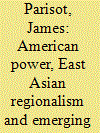

|
|
|
|
|
| Publication |
2013.
|
| Summary/Abstract |
Recent years have seen a revival of discussions on American decline. This paper intervenes in this debate by suggesting that there is a tendency towards partial conceptualisations of US power. It suggests a new historical materialist perspective that makes it possible to theorise American Empire as a relational social totality embedded within global capitalism. The paper then analyses the social limits of China's rise and the integration of East Asian regionalisation into American Empire, suggesting the extent to which world power has shifted east has tended to be overestimated. It also analyses the emergence of Brazil, India, and the brics meetings, suggesting these developments have a limited, but overstated, capacity to challenge American Empire.
|
|
|
|
|
|
|
|
|
|
|
|
|
|
|
|
| 2 |
ID:
144533
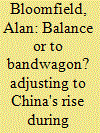

|
|
|
|
|
| Summary/Abstract |
This article examines Australian grand strategy in the context of China's rise during the period of Labor governments between 2007 and 2013. Australia's grand-strategic posture is treated as the dependent variable, plotted along a balancing-to-bandwagoning continuum. Australia remained within the hedging zone throughout, although there were discernible shifts in posture during the period. While momentum was building towards a more overt balancing posture during the Kevin Rudd era, the various balancing and bandwagoning ‘signals’ were more contradictory after Julia Gillard unseated Rudd 2010; in short, she stabilised Australia's grand-strategic posture, meaning it remains best characterized as ‘dominance denial’.
|
|
|
|
|
|
|
|
|
|
|
|
|
|
|
|
| 3 |
ID:
106375
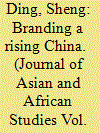

|
|
|
|
|
| Publication |
2011.
|
| Summary/Abstract |
National image is not only a channel to wield a state's national power, but also an important national power resource. It has become critically important for China as it tries to rise in a relatively favorable international environment. Following a theoretical discussion on national image management in international relations and a historical review of China's national image management, this article examines China's strengths and weaknesses in its national image management. On the one hand, China's national image benefits from its strong commitment to cultural diplomacy, effective employment of information and communication technologies in international broadcasting, and close connections with the Chinese diaspora around the world. On the other hand, China's national image management is constrained by such hurdles as weak political credibility, reviving popular nationalism, and various missteps in its foreign policies. This study concludes that China's national image management will remain an uphill battle in the long run.
|
|
|
|
|
|
|
|
|
|
|
|
|
|
|
|
| 4 |
ID:
123029
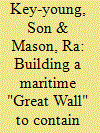

|
|
|
|
|
| Publication |
2013.
|
| Summary/Abstract |
In this article we aim to illustrate both the progress and the stalemates of the US and Japanese strategies to fortify the Okinawan Islands as a bulwark against China. As a conceptual tool to analyze the accommodation and resistance of militarization, we use the notion of a complex interplay of state, market, and societal actors, which showcases the process of mediating and recalibrating risks perceived by policymakers in Tokyo in response to the rise of China. In this process, risk has been shifted to individual stakeholders within society. We argue that the full-scale fortification of the Okinawan Islands will be hard to achieve because of the resistance of local residents and anti-base activists, as well as China's military and commercial strategies to circumvent any form of blockade.
|
|
|
|
|
|
|
|
|
|
|
|
|
|
|
|
| 5 |
ID:
120199
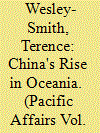

|
|
|
|
|
| Publication |
2013.
|
| Summary/Abstract |
This paper identifies a broad context for assessing China's increased interest in the Pacific Islands, and examines some of the major implications for regional security, regional politics, western influence, and self determination in the region. It argues that Beijing's policy towards the Pacific is not driven by strategic competition with the United States, as some have maintained. Nor is it reducible to a specific set of interests centered on natural resources and, especially, competition with Taiwan. Although these factors are important, China's activities in the region are best understood as part of a much larger outreach to the developing world that is likely to endure and intensify. The paper suggests that China's rise is generally welcomed by island leaders, and makes the case that it offers island states economic and political opportunities not available under established structures of power and influence.
|
|
|
|
|
|
|
|
|
|
|
|
|
|
|
|
| 6 |
ID:
190653
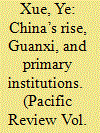

|
|
|
|
|
| Summary/Abstract |
This article focuses on how China views the normative structure of the international order. It integrates the Chinese cultural idea of guanxi into the established English School tradition in International Relations theory and argues that the norm of guanxi is an emerging pluralist primary institution. In this article, the author first presents the emergence of guanxi as a purposive norm in China’s foreign policy, and the interplay of this norm between China and other international actors. Second, the article scrutinizes the establishment of secondary institutions reflecting the norm of guanxi. Third, this article discusses how this primary institution has been consolidated at regional and global levels. In conclusion, this article briefly draws on two major developments of international politics: the cultural diversity of the international order and the emergence of a China-centred international society.
|
|
|
|
|
|
|
|
|
|
|
|
|
|
|
|
| 7 |
ID:
147341
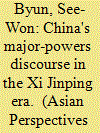

|
|
|
|
|
| Summary/Abstract |
Xi Jinping took office in 2013 with a vision for a “new type of major-power relations” between China and the United States. What does this concept mean and why is it important now? An examination of the current Chinese discourse on major-power relations, as reflected in official and scholarly writings, reveals more continuity than change in China's external orientation. China's major-powers model reinforces (1) peaceful intentions rather than hegemonic aspirations, (2) the primacy of advancing China's domestic development rather than its international position, and (3) tensions between China's dual identities as a rising power and developing economy. The most distinct feature of this model is that it remains a Chinese proposition, posing a question as to the extent to which the United States and China are aligned in perceptions of their future relationship and the international order more broadly.
|
|
|
|
|
|
|
|
|
|
|
|
|
|
|
|
| 8 |
ID:
086980
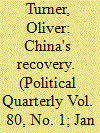

|
|
|
|
|
| Publication |
2009.
|
| Summary/Abstract |
China has been a major power for far longer than is typically acknowledged in the West. This paper seeks to redress established discourse of China as a 'rising' power which now enjoys common usage within Western policy-making, academic and popular circles, particularly within the United States; China can more accurately be conceived of as a 'recovering power'. A tendency by successive Washington administrations to view the world in realist terms has forced the label of 'rising' power onto China along with the negative connotations that inevitably follow. We should acknowledge the folly in utilising a theoretical approach largely devoid of any appreciation for the social and human dimensions of international relations as well as the importance of social discourse in the field. Finally, policy-makers in Washington must reconsider their realist stance and, with a fuller appreciation of world history, recognise that American hegemony was always destined to be short-lived.
|
|
|
|
|
|
|
|
|
|
|
|
|
|
|
|
| 9 |
ID:
191754
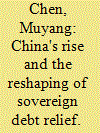

|
|
|
|
|
| Summary/Abstract |
China has become the world's largest bilateral creditor to low- and middle-income countries, and yet its participation in collective debt-relief frameworks led by western multilateral institutions—the International Monetary Fund, the World Bank and the Paris Club—has not met those institutions' expectations. Prevailing discussion perceives China's ‘reserved’ participation as free-riding on or contesting the international sovereign debt regime. This article advances ongoing discussion by drawing a historical parallel between China's current debt-relief approach and that of the United States and the multilateral institutions during and after the debt crisis of the 1980s. The article finds that towards the end of the 1980s, the US transitioned from practicing a new money approach—continued financing for existing projects—to a haircut approach—increasingly writing off debts. Around the same time, multilateral institutions started to become more acceptive of debt forgiveness. Yet China's policy banks, the main financiers of its overseas projects, have been primarily practising a commercially oriented, new money approach. China's rise has therefore revitalized an approach that western private banks once commonly practised and weakened the current international sovereign debt regime that took shape in the post-1980s decades.
|
|
|
|
|
|
|
|
|
|
|
|
|
|
|
|
| 10 |
ID:
098867
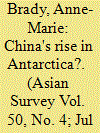

|
|
|
|
|
| Publication |
2010.
|
| Summary/Abstract |
China has begun a new phase in its Antarctic engagement. Beijing has dramatically increased Chinese scientific activities on the frozen continent and is looking to take on more of a leadership role there. This paper draws connections between China's expanded Antarctic program and debates on its foreign and domestic policies.
|
|
|
|
|
|
|
|
|
|
|
|
|
|
|
|
| 11 |
ID:
156061


|
|
|
| 12 |
ID:
137441
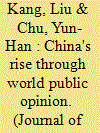

|
|
|
|
|
| Summary/Abstract |
Measuring the perception and attitudes of the world's public toward China has gained new momentum in recent years. In 2009, Shanghai Jiao Tong University's Institute of Arts and Humanities for the first time inaugurated a China-based National Image Survey Project, including a US survey (2010) and 12 Asian countries and regions (2011–2012). Authors in this special issue engage in interpretations and analysis of the data, and one of the most significant lessons is that public opinion, attitudes and perceptions of China's rise are the outcome of dynamic interactions and an assemblage of factors, a synergy of material interests, ideational and emotional reactions, and values, ideologies and principles, unraveling themselves against a highly volatile, precarious and contentious geopolitical backdrop, in which the interests of nation-states and individuals have become intertwined and inseparable.
|
|
|
|
|
|
|
|
|
|
|
|
|
|
|
|
| 13 |
ID:
178895
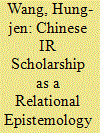

|
|
|
|
|
| Summary/Abstract |
Current anti-Chinese sentiment in the international community has emerged from a knowledge-production background that entails the material fact of China's rising power and ideational factors tied to how the rising China phenomenon is interpreted. The ideational factors can be divided into two groups. One analyses China according to established Western IR theories that describe the country in terms of either threat or opportunity, thereby rendering China as part of an established universal ontology. A second group approaches China's experiences in a more sympathetic light, but still conceptualizes China's rise according to fixed categories such as “nation-state.” This paper argues that both of these groups are guilty of creating self-fulfilling prophecies – that is, they consistently theorize China in opposition to the West owing to the rational epistemology upon which they built their knowledge or perceptions of China. This epistemology conflicts with the efforts of Chinese IR scholars to evaluate China's rise in a relational manner.
|
|
|
|
|
|
|
|
|
|
|
|
|
|
|
|
| 14 |
ID:
137370


|
|
|
|
|
| Summary/Abstract |
This article systematically examines the perceptual dimension of US–China–ASEAN relations. It specifically focuses on Chinese perceptions of American intentions in Southeast Asia, Chinese perceptions of the impact on China of the US's return to Southeast Asia, and suggestions of the Chinese scholarly community as to how China should respond to the US's return. Chinese scholars believe that the US returns to Southeast Asia for a variety of reasons and one of the most important is to manage the rise of China, and that the US's return has both positive and negative impacts on China's interests and the negative impact outweighs the positive. Overall, Chinese perceptions of the US return, especially Chinese scholars’ suggested response, indicate that Chinese scholars have internalized the strategy of peaceful rise which would give us added confidence that China is seriously committed to this strategy. If both the US and China stick to their relevant commitments, the rise of China, unlike that of most great powers in the past, would quite likely be peaceful.
|
|
|
|
|
|
|
|
|
|
|
|
|
|
|
|
| 15 |
ID:
148066
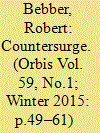

|
|
|
|
|
| Summary/Abstract |
Many experts raise concerns about the “rise of China” and the potential threat it presents to American interests. Indeed, the recent strategic pivot announced by U.S. leaders is designed to address these concerns. Yet what we are likely to see is not a rise of Chinese power, but a surge—a temporary situation of perhaps twenty to thirty years. Demographic, economic, and political factors will all combine to create a ceiling on Chinese power and ultimately cause it to decline. The United States needs to develop military capabilities that will prepare it for the coming strategic window, along with the economic and political initiatives that will enable it to influence events in the region.
|
|
|
|
|
|
|
|
|
|
|
|
|
|
|
|
| 16 |
ID:
131820
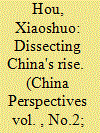

|
|
|
|
|
| Publication |
2014.
|
| Summary/Abstract |
The recent discussion of a "Beijing Consensus" and a China model seems to challenge neoliberalism as the dominating discourse on development. This paper attempts to explain the contradictions in China's development and discusses whether and how they can be redressed. Specifically, the paper analyses the key issues around the debate over the China model - how distinctive it is and whether it can be replicated elsewhere, and what real lessons can be drawn from China's rise. It proposes a more nuanced view of the economic, social, and political structures in China with a focus on its mixed economy, the role of the state at both the central and local levels, and the possibility of Chinese-style democracy. It also offers suggestions for improving the China model.
|
|
|
|
|
|
|
|
|
|
|
|
|
|
|
|
| 17 |
ID:
106703
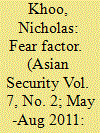

|
|
|
|
|
| Publication |
2011.
|
| Summary/Abstract |
In the face of China's seemingly inexorable rise, how fearful are the key actors in Northeast Asia? Relatedly, how fearful are they likely to be in the future? The academic debate on these questions is characterized by starkly contrasting answers. A typology of the literature is developed whereby analysts are categorized under the rubric of fear deflation, fear inflation, and fear qualification. Through an analysis of empirical survey data and developments during the 2000-2010 period, this article contends that the most appropriate way to characterize Northeast Asian responses to China's rise is via the lens of qualified fear. Through it, one can see that the states on China's periphery are - contrary to the arguments of fear deflaters - exhibiting qualified fear at how China's rising great powers capabilities are wielded. At the same time, levels of fear have not, and arguably will not, escalate to levels posited in the fear-inflation perspective.
|
|
|
|
|
|
|
|
|
|
|
|
|
|
|
|
| 18 |
ID:
112751
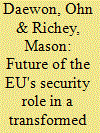

|
|
|
|
|
| Publication |
2012.
|
| Summary/Abstract |
A fundamentally new security landscape is unfolding in East Asia due to the
changing power structure among the great powers, particularly owing to the fast
rise of China and the relative decline of the United States. This paper analyzes the
dynamics of power transition in East Asia and assesses the possibility of the EU
playing a meaningful role in the strengthening of security governance in the
region. It begins by arguing that although the East Asian region is entering a
transformation stage it will not likely lead to a major collision between the United
States and China. This means the EU will have opportunities to become involved
in East Asian security affairs, provided it further strengthens its multi-faceted,
comprehensive engagement policies vis-à-vis the region. We focus particularly
on the EU's ability to promote the positive aspects of East Asian regionalism via
deepened and expanded cooperative measures such as bilateral and multilateral
framework agreements with regional countries and organizations. In addition to
offering a reliable model for regional security governance, the EU will be able to
contribute to regional security by cooperating with the United States and other
East Asian countries and organizations in selected security issues, such as sea-lane
protection, counter-terrorism, non-proliferation of Weapons of Mass Destruction
(WMD), humanitarian operations, etc. Internally, we show that after the Treaty of
Lisbon the EU is approaching incrementally a position wherein it can make
greater CFSP/CSDP engagements-particularly those associated with peacekeeping/
peacemaking and humanitarian operations-in the wider world including East
Asia.
|
|
|
|
|
|
|
|
|
|
|
|
|
|
|
|
| 19 |
ID:
112714
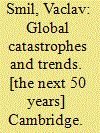

|
|
|
|
|
| Publication |
Cambridge, MIT Press, 2008.
|
| Description |
xi, 307p.
|
| Contents |
Includes bibliographical references and index.
|
| Standard Number |
9780262195867
|
|
|
|
|
|
|
|
|
|
|
|
Copies: C:1/I:0,R:0,Q:0
Circulation
| Accession# | Call# | Current Location | Status | Policy | Location |
| 054389 | 363.34/SMI 054389 | Main | On Shelf | General | |
|
|
|
|
| 20 |
ID:
114118
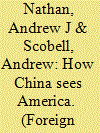

|
|
|
|
|
| Publication |
2012.
|
| Summary/Abstract |
United States worries about China's rise, but Washington rarely considers how the world looks through Beijing's eyes. Even when U.S. officials speak sweetly and softly, their Chinese counterparts hear sugarcoated threats and focus on the big stick in the background. America should not shrink from setting out its expectations of Asia's rising superpower -- but it should do so calmly, coolly, and professionally.
|
|
|
|
|
|
|
|
|
|
|
|
|
|
|
|
|
|
|
|
|